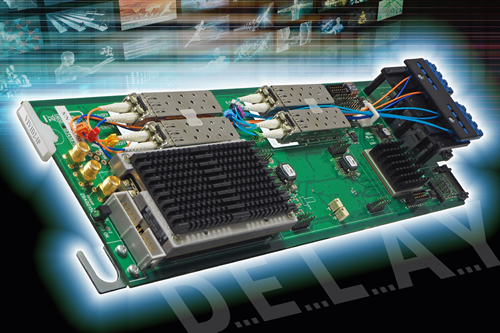Crystal Vision unveils more apps at IBC 2019 with IP and SDI video delays and color correctors (Booth 2.B59)
On Booth 2.B59 at IBC 2019 Crystal Vision will be rolling out the latest software apps for its flexible MARBLE-V1 media processor hardware, with MARBLE's mixed SDI and IP I/O making it easy to transition between SDI, ST 2022 and ST 2110. Each software app can work with IP, with SDI or with both IP and SDI at the same time, giving the easiest possible SDI to IP upgrade as well as being perfect for mixed SDI and IP installations. The apps – which can be replaced as needs change – offer functionality such as video delay, synchronization, color correction, IP to IP processing and gateways. The rest of the interface and keying product range – including the Cleanit profanity delays and Safire 3 real-time chroma keyer – will all be available for demonstration at Crystal Vision's new front of Hall 2 location.

A card housed in the Vision frame, the flexible MARBLE-V1 media processor features a powerful CPU/GPU processor, six bi-directional SDI connections, four 10GbE SFP+ network interface ports and eight bi-directional discrete AES stereo channels. MARBLE-V1's functionality comes from the installation of a software app, with apps that are bought with the hardware able to be replaced with different apps as needs change – helping broadcast engineers to make the most of their budgets. The initial apps for MARBLE-V1 were IP gateways and IP to IP translators for making adjustments to IP flows. These are now joined by an additional four apps providing extremely powerful solutions for a wide range of IP and SDI video delay and color correction requirements.
Crystal Vision is launching two video delay software apps at IBC – the single channel VIVID1-IPSDI and the dual channel VIVID2-IPSDI. Both software apps can work with IP, with SDI or with both IP and SDI at the same time. This makes them equally suitable for IP environments, for SDI installations that will soon change to IP, and for mixed SDI and IP installations where the video delays can connect to both the SDI section and the IP section in any combination of SDI and IP inputs and outputs. The apps work with both SMPTE ST 2022 and ST 2110 video. They are ideal for matching any 3Gb/s, HD or SD extended system delays, such as those caused by virtual studio graphics, MPEG encoders and decoders, audio processing, HD radio links and satellite links. VIVID1-IPSDI provides up to 800 frames of video delay, which is 16 seconds in 3Gb/s and 32 seconds in HD and SD. VIVID2-IPSDI provides up to 200 frames of video delay per channel, therefore four seconds in 3Gb/s and eight seconds in HD and SD. Both apps include a framestore synchronizer allowing engineers to delay and synchronize at the same time. Not only are these are the industry's first video delays to offer IP connectivity, they also introduce an SDI video delay to the Vision frame system for the first time (with the easiest possible upgrade path), and also include IP to SDI and SDI to IP gateway functionality.
Also making their debut on Stand 2.B59 are two color corrector software apps – the single channel COCO1-IPSDI and the dual channel COCO2-IPSDI. Like the video delays, the color corrector software apps can work with IP, with SDI or with both IP and SDI at the same time – giving the easiest possible SDI to IP upgrade as well as being perfect for mixed SDI and IP installations in addition to exclusively IP environments. The apps work with both SMPTE ST 2022 and ST 2110 video. Ideal for manipulating colors to correct for camera or lighting problems or to standardize pictures shot at different times, uses include adjusting the colors on in-shot monitors, being placed before an encoder to set the range of colors to be transmitted and the correction of computer-generated or post production outputs. The apps offer an extensive range of color correction tools including RGB gain, RGB lift, YUV gain, YUV lift, Video gain, Chroma gain, Chroma hue and both overall and individual RGB Gamma adjustment, while they also include a legalizer. The COCO1-IP and COCO2-IP are the broadcast industry's first IP color correctors, give the Vision frame system an SDI color corrector for the first time (with support for even more SDI video standards – 31 – than the Indigo frame version) and also include IP to SDI and SDI to IP gateway functionality.
Other products on the Crystal Vision booth will include the new Cleanit video and audio profanity delay system, which allows a live content stream to be delayed by up to 20 seconds (in HD), giving the operator time to react and prevent the broadcast of unwanted or offensive video or audio material. Available either to buy or for short-term hire, Cleanit has already been used for protecting a diverse range of applications, from television broadcasts to the Internet transmission of eGaming events. IBC also gives visitors an opportunity to try out the Safire 3 real-time chroma keyer, with its simple intuitive workflow for setting up a key, support for resolutions from SD to 1080p and features such as lighting compensation, color correction and video delay to help solve common real world issues.
Based at Whittlesford near Cambridge in the UK and with an office in the USA, Crystal Vision provides a full range of interface and keyers and helps people transition through a range of technologies – from SD to HD, from HD to IP and from IP to IP.
Get the TV Tech Newsletter
The professional video industry's #1 source for news, trends and product and tech information. Sign up below.
